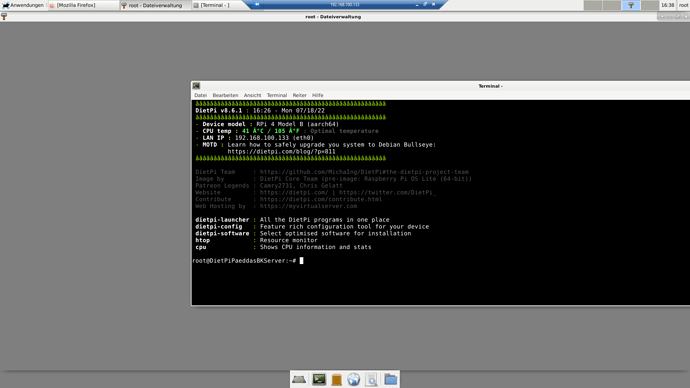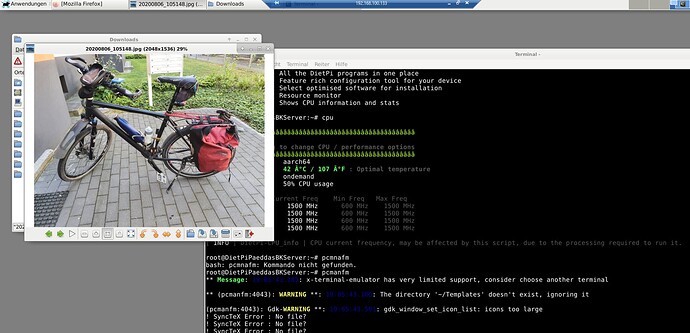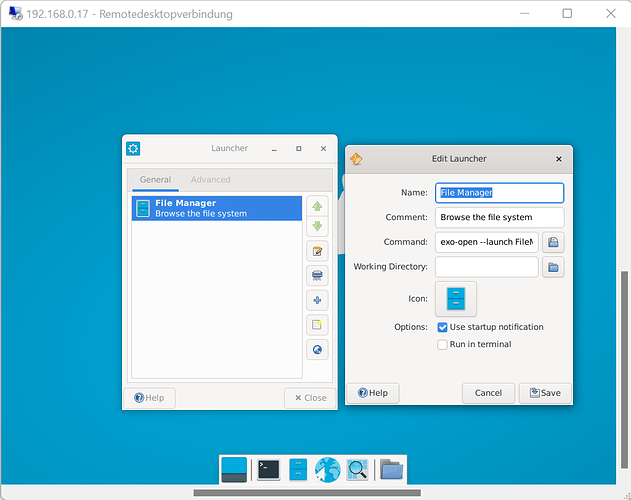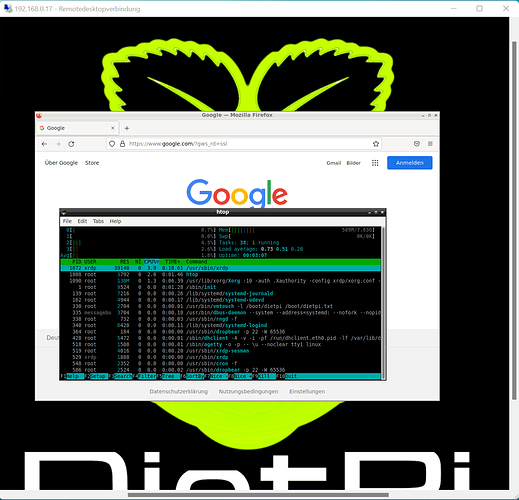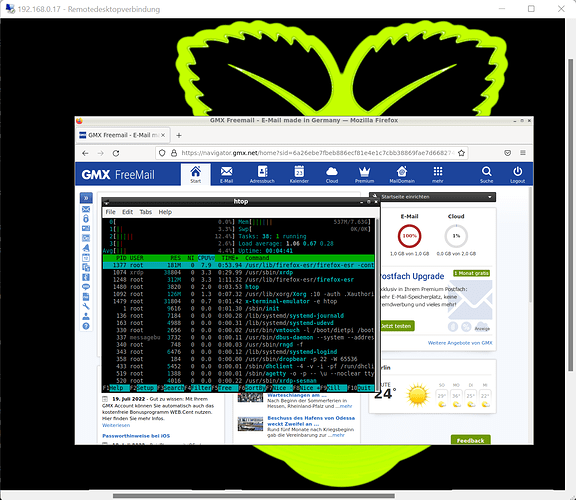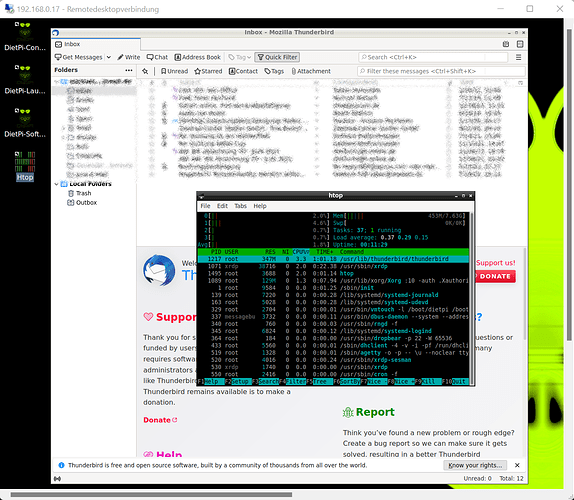As you probably can see, I have a problem opening the root data file browser, I am logged in as root user.
Additional question: Is there a possibility to use Chrome browser, as Chromium is not longer supported regarding the features why you would eventually use chrome as a browser (don’t want to start a discussion, how evil chrome is, I am aware of it…)
My question is: Why is root file browser not working? I have a feeling that it was… Anybody else faces this weird issue? Do I maybe have to install certain extra packages ( I do not remember how I did install the gui and xrdp… but it was maybe a tutorial for debian or …hm … fedora)
Ok, I never did this, but after 1 h of waiting,the root file browser is showing up but the system is frozen. No ssh, no rdp, nothing, even tty is not working, even my logitech squeezeboxserver (quite stable) stopped working. I could only restart the system coldly!
What kind of logs should I investigate?
If I connect as a normal user, I have no problems opening the file browser!
If I do the following in a terminal, I get this message:
user@DietPiPaeddasBKServer:~# su -
root@DietPiPaeddasBKServer:~# pcmanfm
Display cannot be opened
root@DietPiPaeddasBKServer:~#
After I relogged in to the root account and I started it via terminal it works:
I was able to ipen a picture for example.
So the problem only persists if I manage to open it via the task bar below:

Any ideas here, what I can examine more?
Ok very weird, I opened the properties or the starter and it offers weird stuff:
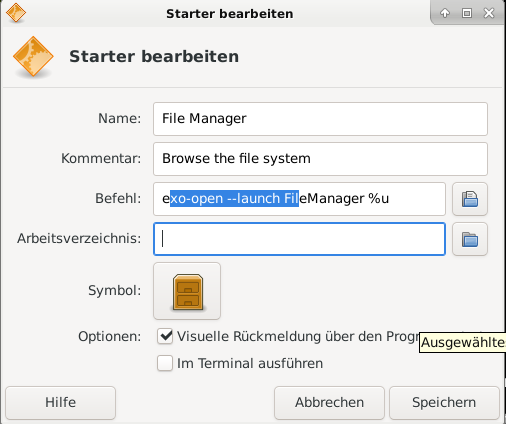
Sorry again, that it is in German, unfortunately. Normally I try to configure my OS’s all in english, I missed that here with dietpi somehow.
But I have never seen such a command:
exo-open --launch FileManager %u
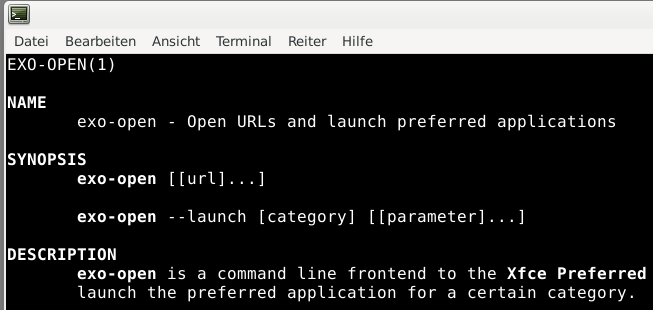
So the solution was quite simple. I edited the starter to open pcmanfm and now it works!
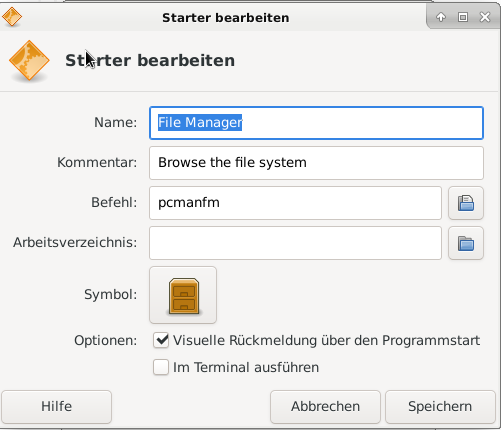
I did a check with our standard xrdp installation using Xfce and for me this is working without issues using default setiings.
Ok, Joulinar, and you did with root account?? Than we do not have a solution. I will then uncheck the solution…
Just to avoid a misunderstanding. I used our automated installation script to setup xrdp and Xfce.
1 Like
On the pi, where I have my problems, is also a tigervnc environment. It could be, that I somehow messed up the system somewhere, but on my other pi, I just installed xrdp using your script (dietpi-config)…
@Joulinar , Please help!
I still have my problems regarding xrdp. First I thought it is related to chromium, but also firefox and now thunderbird (ok I will deinstall this, looking for a good lightweight solution here). But anyway: Every action I do results in a tremendous cpu load. And if run those program a long time, the system will be more and more inusable until it finally freezes. Even if I have ssh connection open, it takes minutes to stop the hungry processes and kill them.
I am a little desperated, cause I think a raspberry pi 4b with 2 GB should be good enough to handle evntually gui work… What can I do here, to end this nightmare? How can I examine, or are there any other known facts, which might help me here?
maybe deinstall all graphical components(xrdp, xorg, xfce, etc,.) . How to do it sober here, so that I can proper reinstall it?
Probably htop tells you which process exactly causes such high CPU usage or other resources like RAM.
@MichaIng
Sorry I forgot to mention:
These processes I have identified with htop or top:
- Thunderbird (up to 158%)
- firefox (70%)
- xorg (30%-70%)
- xrdp (70%)
And that was only in the beginning, because sooner or later the system gets inresponsible.
What would be your way, to cleanly reinstall those dependencies??
I’m not 100% sure if already stated, but what system your are running on?
- DietPi version |
cat /boot/dietpi/.version
- Distro version |
echo $G_DISTRO_NAME $G_RASPBIAN
- Kernel version |
uname -a
-
Versions of dietpi
~# cat /boot/dietpi/.version
G_DIETPI_VERSION_CORE=8
G_DIETPI_VERSION_SUB=6
G_DIETPI_VERSION_RC=1
G_GITBRANCH='master'
G_GITOWNER='MichaIng'
G_LIVE_PATCH_STATUS[0]='applied'
G_LIVE_PATCH_STATUS[1]='applied'
-
Distro of raspbian
~# echo $G_DISTRO_NAME $G_RASPBIAN
buster 0
-
Linux Distribution
~# uname -a
Linux DietPiPaeddasBKServer 5.10.103-v8+ #1529 SMP PREEMPT Tue Mar 8 12:26:46 GMT 2022 aarch64 GNU/Linux
System is up to date. Regarding dietpi - update and apt update & upgrade.
ok you are on Debian Buster (still). Would take some time to get a new SD Card ready with this.
Anyway. I did a test using LXDE + Firefox + XDRP from our software repository on a RPi4B 64bit. At least for me, there is no high CPU usage while opening google search
1 Like
@joulinar, Thanks for testing!
Would you recommend me dist upgrading it? I have never thought of doing this on a pi. I normally use a Ubuntu on my computer.
Or better a fresh install?
OK Google was not producing high load. I had 5 tabs open, GMX (German email provider) was one of them. Ok could be a script thing. But as far as I remember, it used to happen only with GMX open in one tab…
What would you suggest as an email client? Thunderbird definetely uses too much ressources, it seems. Only downloading emails nearly causes the system going down and it was awfully slowly…
ok let me check using GMX
EDIT
hmm having GMX on 1 tab open doesn’t seems to be an issue
Thunderbird seems to be working fine as well
1 Like
WEB Browsers today have a large resource requirement and 4 GB of real RAM is hardly sufficient for intensive use. You can mitigate this by using swap space.
I have a habit of opening many pages in tabs in my browser. I use this as a resubmission function for pages I want to follow for a short time. Open tabs seem to have the habit of requesting more and more memory, even if they are not actively viewed. This leads to the fact that sooner or later memory swapping begins. When swapping starts, all swap space is used up very quickly and the system responds very laggy. Unfortunately, the eviction capability of the swap space in linux is currently not particularly efficient. My workaround was to close and reopen the browser to free up the used memory. I then only reactivated the tabs of most interest, but over time I reaktivated more tabs and the game starts again.
Multi-gen LRU can help improve memory usage. I have been using MGLRU patches since the first post of @jock in my kernel builds. With the MGLRU feature in place, the situation seems to improve. Memory swapping seems to kick in way later and if swapping, filling up the swap space feels way slower.
2 Likes
Actually quite a good question. How does memory allocation looks like while facing the issue?
Hi, thanks so much for the detailed information!
I have heard of MULTI-GEN LRU the first time. What is it and howto patch and from where…?
Do I have to compile my own kernel? I have done this only for a couple of times, years ago…when I was building an embedded board support package for my arm device at work. I think I forgot… Всё забыл!
I will soon report, cause I tend to open many tabs though on the raspberry I refused, at max 3 to 5.
But today and tomorrow I am off, going to Amsterdam ziggo dome for pearl jam Concerto … 
